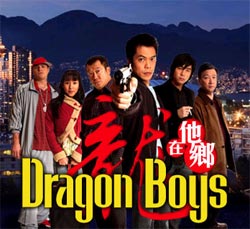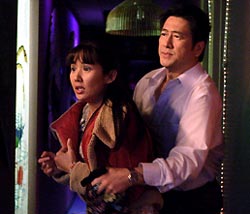Boys Will Be Boys: 2007 SF Asian-American Film Festival (Part 3)
 |
Andrea Jiang: You’re out there on the front line, stamping out the yellow peril. These guys threaten how you see yourself, so you’re out there like a Samurai warrior, taking them on one by one. You know, you could say something if you really wanted to. This is our lives we're talking about.
Tommy Jiang: Samurai are Japanese.
---
The longest film in this year's festival wasn't even a film -- it was actually a four-hour Canadian miniseries (three hours plus commercials) that aired on CBC TV a few months ago. Transplanted directly from the tube to the big screen, Dragon Boys aims to be a sprawling saga of cops, criminals, and civilians, with Chinese actors unapologetically taking center stage. Director Jerry Ciccoritti, who was in attendance, assured the crowd before the film started, "It's long, but I promise you it goes by fast."
Fortunately, he wasn't lying. At three hours, you might shift in your seat a few times, but Ciccoritti, a veteran TV director, knows how to keep things moving. Like any good work of serial fiction, a lot of the fun comes from following the multiple storylines and characters as they criss-cross and collide with each other. Things start off with an immediate bang as Chinese thugs raid a Caucasian gangster's home and proceed to slice off his face with a meat cleaver (mercifully offscreen). Investigating the crime is detective Tommy Jiang (Byron Mann), your typical distracted family man and dogged cop, and he soon finds himself involved in a power struggle between two Chinatown crime lords -- top dog Willie "the Duck" Lok (Eric Tsang, basically reprising his baddie role from Infernal Affairs) and young upstart Simon Au (Lawrence Chou), also known as "Movie Star" (you know you're in Chinese crimeland when characters have names like Movie Star, Fox Boy, and Fat Ass, and new criminal recruits are dismissed as "eggrolls").
 |
There's your scorecard -- now add some peripheral henchmen, assorted assassination attempts and games of one-upmanship, and enough tangled plotlines to fuel a few seasons' worth of drama, and play ball. Dragon Boys is unapologetic genre entertainment, replete with no-nonsense TV rhythms and the usual signposts of a tough gangland thriller: sleek Mercedes sedans, belligerent cell phone calls, wiseguy conferences that deteriorate into "mine is bigger than yours" face-offs, people's skulls getting battered by shiny briefcases and clubs, bloody clothes in garbage bags, glittering nightclubs and hookers, hands submerged in boiling cooking oil.
But apart from a few f-bombs and a scene or two of pummeling, there's little here that will confuse this with The Sopranos, because Ciccoritti is a relatively genteel director, more interested in plot movement than character. This is a good thing, because Ian Weir's script tends to lean towards what I call the James L. Brooks school of character development: Take an established stereotype, throw in a reversal to give the illusion of three-dimensionality, run with it. For example, Jiang may be a good cop, but he's a "whitewashed" soul with the trophy blond ex-wife who sees right through him (see the quotation at the top). Chavy begins her story as the wide-eyed innocent, but by the end she's been hardened by fate into your standard tough broad (her mangled delivery of the line "wiggle your ass" is a highlight). Henry Wa is a solid citizen, but when his son's life is threatened he gives in to his submerged violent impulses. Belinda Lok is a cold, unfeeling madam, but she has a soft spot for her hired help and the women under her wing. And so on and so forth.
 |
Some might find this film to be an unflattering portrait of the Chinese community, what with the usual stereotypes (gangsters, restaurant owners, whores) in evidence. Ciccoritti addressed the issue in the post-film Q&A, musing that characters shouldn't be judged by their socio-economic status, but how compelling they are as characters. Not a bad reply, although his case would be served better if the characters actually did have three dimensions, a la The Sopranos.
But the Chinese in the film definitely have it over their white counterparts, who are either portrayed as skeptical critics ("Every time two Chinese guys get together, white people think they’re a gang") or comically inept henchmen.
Dragon Boys has been hailed as a kind of breakthrough, in that we have a predominantly Chinese cast headlining a major network miniseries (a sequel is already in the works), and perhaps there's something to that, as modest as that achievement may be. It doesn't offer anything startling in terms of story, and its insights into the Asian condition are more like sidelong glances, but at least those Asian faces are very much in the spotlight, and there's a hint of sadness in the ending: Jiang, his mission seemingly accomplished but at great personal cost, stares at a sunset on the beach, looking west but actually looking to the East, at the China that he can't leave behind, no matter how much he might want to.


0 Comments:
Post a Comment
<< Home